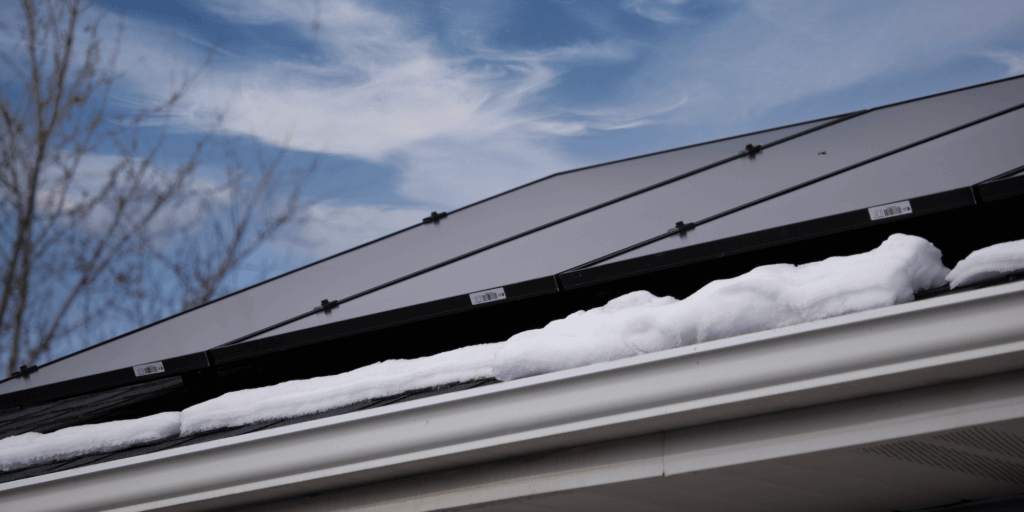

The holiday season brings joy, warmth, and sometimes can result in higher energy bills because of the added use of lights, heating, and electronics during family gatherings. However, with solar power, holiday cheer doesn’t have to come with extra costs. Here’s what homeowners can expect during the holidays, the role of peak hours, and some holiday energy-saving tips for each room in the house.
Seasonal Increases in Energy Use
Cooler weather means heating systems are working harder and more frequently, and festive decorations—especially lights and lawn decor—drive up electricity use. Studies show Americans use 3.5 billion kWh of electricity in the month of December, just to power holiday lights!

What Homeowners Can Expect During the Holidays
If you’re a homeowner with a rooftop solar panel system installed, you’re already reducing your dependency on the utility grid and keeping electricity costs to a minimum. If not, reach out to our solar experts on how to get started with your solar journey. Solar panels perform better in cool, sunny conditions than in hot weather, so clear winter days can be ideal for solar production.
In some regions where it snows a lot, however, the winter season can bring more overcast days, potentially reducing the overall energy production. Tracking your solar system’s performance can give you insight into its efficiency and help you manage consumption effectively, even if it is cloudy.
The Role of Peak Hours During the Holidays
Peak hours, when electricity demand and rates are highest, can vary based on your local utility company. Many utility companies set these peak hours in the late afternoon or early evening, which coincides with times when holiday activities and heating systems are at their highest. During the holidays, these peak periods often align with increased energy usage from festive lighting displays, elaborate meal preparations, and gatherings requiring additional heating or cooling.
If your area has a time-of-use (TOU) rate plan, running appliances during off-peak hours can lead to savings. Consider setting your lights on timers and running high-consumption appliances, like dishwashers and dryers, outside of peak times (typically in the evening when everyone is home). Additionally, holiday-specific activities, such as baking and cooking, can be scheduled earlier in the day to take advantage of lower utility rates. Solar energy storage, if available, allows you to save any extra energy produced during the day for later use, helping you avoid drawing from the utility grid at higher rates. Leveraging these strategies not only reduces your energy bill but also helps ease the strain on the utility grid during these high-demand periods.

How to Save Energy During the Holidays—Per Room
Reducing energy use in each room can lower your holiday electric bill. Try these practical tips:
Living Room
- Decorate Wisely: Opt for LED holiday lights, which use up to 80% less energy than traditional incandescent bulbs. Smart holiday lights and timers can help you manage lighting duration and avoid energy waste.
- Adjust Heating: Keep blankets nearby so you can lower the thermostat a few degrees, especially during large gatherings. The warmth from guests tends to raise the room’s temperature, allowing you to keep the thermostat set to a lower temperature. Additionally, avoid using electric fireplaces, as they consume a lot of electricity. For comparison, an electric fireplace can use about 26 kWh per day to heat your entire home, while a gas furnace requires just 600 watts to start up.
- Unplug Devices: Turn off or unplug electronics when not in use. Decorations like tree lights can consume large amounts of power when left on or plugged in when not in use. Installing smart plugs can help you stay on a schedule and save energy, while still enjoying your decor.
Kitchen
- Optimize Your Cooking Time: The kitchen is often the heart of holiday activities, with ovens and stovetops working overtime when hosting and preparing meals. When baking, cook multiple dishes simultaneously, and use the oven light to check on food instead of opening the door, which can cause heat loss. Be mindful of peak hours in your area and avoid cooking in those times.
- Use Energy-Efficient Appliances: If you have a slow cooker, air fryer, or toaster oven, consider using these instead of the oven, as they use less power to operate. When using the dishwasher, wait until it’s fully loaded, and avoid the heated dry setting as it is much more energy efficient to let your dishes drip dry.
- Unplug Devices: Turn off or unplug appliances, like blenders and toasters, when not in use to avoid using excess energy in the kitchen.
- Help Your Fridge/Freezer Save Energy: Set your refrigerator temperature between 35°F and 38°F and your freezer to 0°F for optimal efficiency. Allow hot food to cool before placing it in the refrigerator to prevent the appliance from overworking. Additionally, avoid blocking air vents with large items, as this can cause uneven cooling, with some items freezing and others overheating.
- Wash Holiday Dishes Efficiently: Modern dishwashers, especially those made after 2013, use less water and energy than hand washing. Avoid pre-rinsing; scrape off food instead, as newer models clean effectively without it. Utilize energy-saving cycles and the no-heat air-dry feature or open the door after the final rinse to air-dry dishes. Lower your water heater’s temperature to 120°F, as most dishwashers have built-in heaters to boost water temperature for optimal cleaning, further reducing energy costs.

Dining Room
- Natural Light: Schedule large meals earlier in the evening (around 4:00 pm-5:00 pm) to take advantage of natural light and avoid turning on more lights than necessary. Also, consider purchasing and using LED candles to create ambiance, as they consume very little energy and can add a cozy holiday glow. Lighting real candles is another great alternative.
- Turn off the Lights: Make sure the lights are turned off when you leave the room. By using only the electricity you need, you can save money on your utility bills.
- Keep Air Vents Clear: One energy saving tip people may not consider is keeping air vents open and clear of furniture. When air vents are closed, or blocked off, your HVAC system experiences increased pressure. This pressure can lead to damage or leaks causing bigger problems down the road.
Bedrooms
- Lower the Thermostat at Night: Reducing the temperature by a few degrees while you are sleeping can lower energy consumption and you can add more warmth by adding a few more blankets or bedding layers. Programmable thermostats are ideal for setting temperatures to automatically adjust.
- Limit Use of Electric Heaters: While electric space heaters can provide heat quickly, they consume a lot of energy. If possible, use other heating methods, like insulated curtains or blankets to keep rooms warm.
Bathroom
- Hot Water Management: When guests stay over, showers, sinks, and washers get used more frequently. Lower the water heater temperature to around 120°F to prevent scalding and save on water heating costs.
- Efficient Lighting: Install LED light bulbs, if possible, and remind family members and guests to turn off lights when leaving the house or room.

Bringing it All Together
The holiday season is a time to celebrate with family and friends and not worry about high energy costs. By avoiding peak hours, planning energy use strategically around seasonal increases, and making small adjustments in each room, you can keep holiday energy bills in check. For homeowners, these tips can add up to savings, helping you make the most of your rooftop solar panel system and enjoy the holidays.
By partnering with Blue Raven Solar, you’re not just saving on energy costs; you’re investing in a sustainable future for your family. Our team of experts can ensure a seamless transition to solar power, providing customized solutions tailored to your needs. With Blue Raven Solar by your side, you can celebrate the season knowing you’re achieving higher energy independence.



Sorry, the comment form is closed at this time.